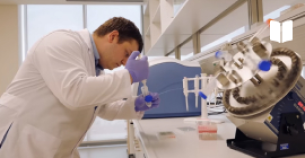ACADEMIC AUTONOMY AND FREEDOM OF EXPRESSION
University; recognizes the importance of promoting and protecting academic freedom in education and scientific research for faculty members.
It is the policy of Acıbadem University to protect and encourage the freedom of teaching staff to express their opinions, to teach, to research and to publish, and to protect them from influences from inside or outside the University that would limit them. Teaching staff; has the freedom to publish research and results, provided that he/she fulfills his/her other academic duties adequately, even if it is an education-oriented assignment, and is subject to the institutional policies and procedures specified in the University's research policies. The external financial gain that the lecturer will obtain after the research carried out should be based on mutual agreement with the authorities of the institution. This process is carried out in accordance with the Directive on Invention, Production and Service Activities at Acıbadem Mehmet Ali Aydınlar University. The instructor is a part of a profession and an educational institution with the identity of an educator. He/She has the freedom to discuss the subject in which he/she is an expert in the classroom environment. When speaking or writing as an individual, he/she should be free from institutional censorship or restrictions, but he/she should know that her position in society comes with certain obligations. The instructor, who is still in the learning process, should keep in mind the influence of what he/she says and writes as a member of an educational institution on forming an opinion by the society about his/her profession and the institution he/she is a member of. Therefore, the instructor should always respect the opinions of others and indicate this when not speaking on behalf of the institution.
ACADEMIC STAFF PRIMARY PROFESSIONAL RESPONSIBILITIES AND DUTIES
The main professional responsibilities and duties of the teaching staff are determined by the 22nd and 31st articles of the Higher Education Law No. 2547.
According to this;
Instructor duties are:
ARTICLE 22
a. To carry out education, training and applied studies at associate, undergraduate and graduate levels in higher education institutions and to manage project preparations and seminars in accordance with the purposes and principles of this law,
b. To carry out scientific research and publications in higher education institutions,
c. To accept students on certain days according to the program to be organized by the head of the relevant unit, helping them in necessary matters, leading and guiding them in line with the purpose and main principles of this law,
d. To fullfil the duties assigned by the authorized bodies, e. To perform other duties assigned by this law. Instructor duties are:
ARTICLE 31
Lecturers; persons who are known for their studies and works in their fields of expertise can be assigned with a periodical or hourly fee for courses in which there are no lecturers appointed in accordance with this Law in universities and their affiliated units, or for the education, training and practice of any subject that requires special knowledge and expertise.
CONSULTING / MENTORING DUTIES OF TEACHERS:
It is defined in Acıbadem University Associate and Undergraduate Education and Examination Regulations:
ARTICLE 27 – (1) The head of the relevant department assigns an advisor for each student. The advisor monitors the student and advises the student on the compulsory and elective courses that the student should take within the framework of the education programs that the student is continuing, double major-minor programs. During the registration or renewal of the year/semester enrollment, the student organizes his/her lessons together with his/her advisor. In addition, "School of Medicine Mentoring Program" is carried out in the School of Medicine.
School of Medicine Mentoring Program Scope and Definition: Mentoring; is a concept that originated from ages ago. Although used synonymously with faculty advisor in academia, the main difference between mentoring and advising is that mentoring requires a personal relationship as well as a professional one. The mentoring relationship develops over a long period of time. It can change according to the student's needs. The mentor should be aware of these changes and changes, and should be able to adjust his/her attention, help and suggestions, information and motivational incentives accordingly.
A physician candidate may have more than one mentor at different ages, with different equipment and with different personalities during his/her education. He/She derives different benefits from each. The mentor is a role model equipped in his field of expertise, aware of scientific developments and up-to-date information. The mentoring relationship is characterized by mutual respect, trust, understanding and empathy.
Purpose of the Program:
ACUTIP mentoring and peer mentoring system aims to support our faculty students in their medical education process and guide them in their psychosocial development and future career decisions. The mentoring system covers all students studying at our faculty and allows them to communicate with their faculty members and their peers one-on-one.
Mentor's Responsibilities:
- To make face-to-face meetings at least twice a year by contacting the student they are mentoring.
- To guide the students in the subjects they need in relation to medical education, to transfer their knowledge and experience.
- To follow the success and social status of the student at school, to contact the relevant committees through the Mentorship Program Coordinator when necessary.
- Being a role model and sharing the medical skills developed over the years in order to prepare the student for life after graduation.
- Notifying the Dean's Office in writing in cases where he/she will be interrupted or unable to fulfill his/her mentorship duty for any reason.
Student Responsibilities:
- Requesting a meeting with the mentor within one month following the appointment of the mentor lecturer.
- Communicate face-to-face with the mentor at least twice a year.
- Notifying the Mentor and Mentoring Program Coordinator of contact information changes.
Responsibilities of Peer Mentors:
- Getting in touch with the students they mentor.
- To guide the students they are peer mentors on the subjects they need, to transfer their own knowledge and experiences.
- Meeting face-to-face with students they are peer mentors at least twice a year.
- Informing the Mentoring Program Coordinator in writing in case he/she cannot continue her peer mentorship for any reason..
The ACUTIP Mentoring Program Directive contains the basic features and application principles in detail.
TEACHING STAFF - ADMINISTRATIVE PERSONNEL RELATIONS
Today, modern universities need personnel suitable for the nature of the job in order to cope with the ever-changing needs. As universities become more assertive academically, the need for the necessary number and quality of administrative personnel to achieve these goals increases. Acıbadem University administrative staff; consists of tens of talented and qualified employees who give importance to education-training, academic and administrative personnel affairs, research & development and institutional development, have work experience and have trained themselves professionally and individually. Administrative staff; are organized as units or offices in order to support the work of the teaching staff and to provide the best possible service to the students.
Administrative staff at Faculties, Vocational Schools, Institutes and Centers, Academic and Administrative Human Resources Department, Student Affairs Directorate, Financial Affairs Directorate, Library and Electronic Resources Directorate, IT Department, Directorate of Health, Culture and Sports, Corporate Communications Unit, Candidate Relations and Promotion Unit, International Student and Academic Relations Unit, in Laboratories, Dining Hall - Cafeteria Services, Security Unit, Technical and Support Services Unit and in all other units, make the utmost effort to ensure that the business processes are carried out in a timely and healthy manner.
The duties of the administrative staff include; to ensure the coordination and regular execution of all the works of the academic & administrative staff and the students of the Faculty, Vocational School and Institute, to work together with the academic staff to present their suggestions and thoughts within the framework of the legislation in the preparation of the Regulations and Directives, to take an active role in the management of the protocol, press and public relations related jobs and transactions to be made within our university, to forward the unit’s purchase requests of goods and materials to the Rectorate, taking the necessary security measures on the university campus, following up continuous updating of the university web page, the organization of official openings, graduation ceremonies, congresses, conferences, seminars, symposiums, etc. Working together with our instructors in the realization of social and cultural activities, responding to requests from outside the institution, documents and other requests in a timely manner, to ensure that cleaning, maintenance and repair services are carried out regularly, to cooperate with those responsible for the proper functioning of the laboratories, to provide the necessary environment for the sustainability of the working order of the academic staff, to work in harmony with all the employees working at our University, and to provide continuous support to the instructors to ensure that the most research activities, especially education and training, are carried out in the best possible manner. In this respect, administrative staff deserve the respect, appreciation and evaluation of all lecturers due to their self-sacrifice, effort and sense of responsibility.
DISCRIMINATION AND SEXUAL HARASSMENT
Participation in the academic community also entails an obligation to faculty, administrative staff and students to respect the dignity of others, express different views, intellectual honesty, freedom to question and teach, and freedom to promote and defend free expression, on and off campus. Any discriminatory behavior undermines the atmosphere of trust and respect necessary for a healthy academic environment. Therefore, Acıbadem University's policy is to provide an environment free from discrimination based on race, color, religion, gender, sexual orientation, national or ethnic origin, age, disability or seniority. Sexual harassment includes requests for sexual approach and sexual or gender-based verbal or physical behavior. It may include behavior such as sexual or gender-based unnatural touching or unpleasant behavior (physical, verbal, written or through technology). Acıbadem University is committed to promoting an environment free from all forms of sexual abuse, including sexual assault and sexual harassment. To support this commitment, the University takes steps to raise awareness of such misconduct, eliminate its occurrence on campus, provide support to survivors, diligently investigate all reports of sexual misconduct, and rigorously investigate criminal elements. Creating a safe campus environment and a culture of respect is the shared responsibility of all members of the University, individually and collectively. Acıbadem University recognizes that sexual assault, harassment, discrimination and other forms of sexual abuse can have a profound impact on a person's personal, academic and working life. The University encourages those exposed to such a situation to seek help and support in coping with it.
EMOTIONAL RELATIONS
Acıbadem University is committed to providing an educational environment where learning can flourish. Romantic and sexual relationships between instructors and students, even consensual, negatively affect this environment. Differences in position and power between students and those in positions of teaching, advising, supervising, evaluating, mentoring or mentoring them call into question the student's ability to consciously consent to such relationships. When an instructor and a student have a romantic or sexual relationship, an instructor's credibility in teaching, advising, and evaluating students in an impartial way is undermined. Even if the instructor and student act virtuously, others may perceive it as partially and often biased. The sudden termination of such relationships can have negative effects on the learning environment and harm both the instructor and the student. Sexual or romantic relationships between individuals in naturally unequal positions have the potential for serious breach of trust. Especially when it is realized that this relationship also affects third parties, it can negatively affect the University environment and may extend to accusations such as conflict of interest, nepotism and abuse of power. Often, such relationships end in less reconciliation than is thought. Even when such a relationship ends, there is a risk of bias against the former romantic partner long after the relationship is over.
Sexual or romantic relationships between individuals in naturally unequal positions have the potential for serious breach of trust. Especially when it is realized that this relationship also affects third parties, it can negatively affect the University environment and may extend to accusations such as conflict of interest, nepotism and abuse of power. Often, such relationships end in less reconciliation than is thought. Even when such a relationship ends, there is a risk of bias against the former romantic partner long after the relationship is over.
Due to the potential vulnerability of undergraduates in such relationships, sexual or romantic relationships between faculty and undergraduate students are not tolerated in any way. If an instructor has a previous sexual or romantic relationship with a student, the instructor should not only release any responsibility for counseling on that student, but also immediately inform their supervisor so that different educational or counseling arrangements can be made.
DISCIPLINE ISSUES AND JUST TERMINATION
The University may terminate the contract unilaterally by the University if the instructor violates the obligations defined in Articles 4 and 5 of the Instructor Contract or other commitments specified in this contract, or if it causes one of the following conditions.
- As a result of the disciplinary investigation to be opened in accordance with the 53rd article of the Higher Education Law No. 2547, he was sentenced to dismissal from duty,
- Behaviors and statements against the Founding Foundation or the University,
- Making a statement to the press, other than scientific matters related to his field of duty, and making written or oral explanations, without the written permission of the Rectorate,
- The Instructor shall not disclose any information to third parties about the affairs, accounts, financial situations, professional secrets, activities, agreements, transactions or interests of the University, ASG or subsidiaries or their owners and managers, which he knows about or learned during his studies, without the written permission of the University, and he/she accepts and undertakes not to allow the disclosure of the information and not to use them even personally. The employment contract of the academic staff who are found to act in violation of this condition will be terminated immediately.
- A faculty member cannot leave his/her duty during the contract period for any reason, except for attending congresses and conferences, sick leave based on the report to be obtained from official health institutions, and other permissions obtained from the Rector's Office. The University may terminate the contract without compensation if the instructor does not come to his/her duty without an excuse and without prior notice, and the absence is up to "3" days each time and this absence is repeated three times within the contract period. If the absence of the instructor exceeds 3 days at a time, it is the reason for the termination of the contract without compensation.



